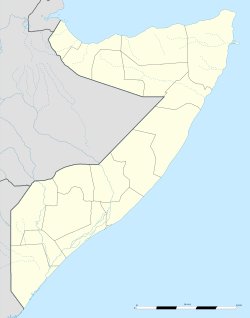| 2023 Mogadishu tea shop bombing | |
|---|---|
| Part of the Somali Civil War | |
| Location | Mogadishu, Somalia |
| Date | 29 September 2023 |
| Target | Civilians |
Attack type | Suicide bombing |
| Weapon | Explosive belt |
| Deaths | 11 |
| Injured | 18 |
| Perpetrator | Al-Shabaab |
On 29 September 2023, an al-Shabaab suicide bomber detonated an explosive belt in a tea shop in the capital Mogadishu, Somalia, leaving 11 dead and 18 others injured. [1] The explosion took place at a checkpoint leading to the parliament and the president's office. [2]
Contents
Later that day, al-Shabaab claimed responsibility and a man was arrested who was believed to be a suspect of supplying weapons to the group and to be one main illegal arms dealers in Somalia. [3] [1]
